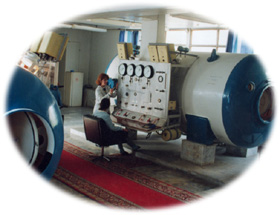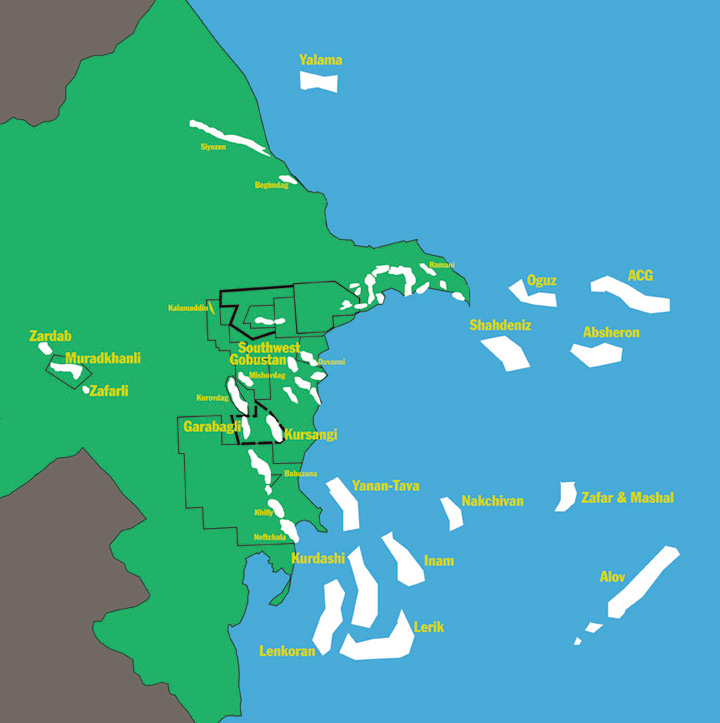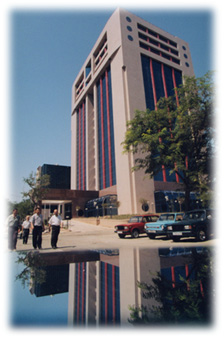flat72.jpg)

•
•
• Demographics
•
•
•
•
•
•
• Foreign Trade
• Privatization
•
•
•
•
•
•
• Caspian Basin Issues
•
•
• Oil & Gas Agreements
•
•
 Financing & Insurance This section contains several articles: 1. The U.S. Trade and Development Agency, 2001 Melissa Eustace, NIS Country Manager TDA 2. Project Financing, Insurance and Investment Guarantees, 2001 Aliya Nuriyeva, Program Coordinator International Finance Corporation 3. Export - Import Bank of the United States, 2001 Paul Tumminia Senior International Business Relations Officer, Export-Import Bank of the United States To obtain the following articles, please contact USACC THE U.S. TRADE AND DEVELOPMENT AGENCY Melissa Eustace, NIS Country Manager U.S. Trade and Develoment Agency TDA's Mission The U.S. Trade and Development Agency (TDA), an independent federal government agency, provides funding for U.S. companies to carry out feasibility studies on major projects in developing and middle-income countries. TDA-funded studies are designed to provide the detailed planning information needed to garner financing for implementation of the projects. In many of these projects, U.S. companies face foreign competition, often with government support. Thus, in addition to providing financial assistance to U.S. companies, TDA involvement provides countervailing political support by putting the imprimatur of the U.S. Government on a project. TDA has been operating in the New Independent States (NIS) of the former Soviet Union since 1991, providing about $85 million for feasibility studies on over 200 projects. In carrying out its NIS program, TDA coordinates with two other federal agencies, the Export-Import Bank of the United States (Ex-Im Bank), which provides financing and guarantees for U.S. exports, and the Overseas Private Investment Corporation (OPIC), which provides insurance and financing for U.S. investments in the region. For several years, TDA, OPIC, and the Ex-Im Bank have been exempted from Section 907 of the Freedom Support Act, thus permitting the three agencies to operate in Azerbaijan. TDA maintains close relations with multilateral financing agencies that are active in the NIS - the World Bank, the European Bank for Reconstruction and Development (EBRD), and the International Finance Corporation - as well as the various private and public sector investment funds that have been established to support projects in the region. Much of TDA's early activity in the NIS was concentrated in Russia, the region's largest republic. But TDA recently has become particularly active in the non-Russian NIS, especially the Caspian region. The Caspian region has attracted attention mainly because of its hydrocarbon potential, and TDA activities in the region have largely been focused on energy development, in support of the U.S. Government's multiple pipeline policy. Because of its location and ethnic connection with many of the countries of the Caucasus and Central Asia, Turkey has an important role to play in the Caspian region. Thus, TDA has included Turkey in its Caspian development strategy. As a kick-off event for its new focus on the Caspian, in May 1998, TDA organized the highly successful Crossroads of the World Conference in Istanbul, which brought together over 750 government officials, local project sponsors and U.S. company representatives. At the Crossroads Conference, then-Secretary of Energy Pena announced the Caspian Finance Initiative, involving TDA, Ex-Im Bank and OPIC. An important step in the Initiative was the establishment of the Caspian Finance Center in Ankara, Turkey, which became fully operational in January 1999. The Center is staffed with representatives of TDA, Ex-Im Bank and OPIC.
In May 1999, TDA sponsored the Caspian Ambassadors' Tour, which brought six U.S. Ambassadors from the Caspian region on a ten-day tour of three cities (New Orleans, New York City and Washington, D.C.) to present the business opportunities in their respective countries to U.S. companies. While oil and gas development and transport are central to the economic development of the Caspian region, TDA is making a special effort to identify opportunities for U.S. companies in the ancillary infrastructure that will be built as a result of the pipelines, such as water, power, railroads, highways, telecommunications, hotels and health care and retail facilities. Last year, TDA hosted the Caspian Region Health Care Symposium in Tashkent, Uzbekistan, which brought together key health sector officials and project sponsors from the Caspian region countries, the U.S. Ambassadors from the region, American health sector and finance specialists, and U.S. health care industry representatives. This year, from 24-26 June 2001, TDA hosted "Making Connections with Eurasia," an NIS and Turkey Telecom and IT Conference in Brussels, Belgium. This event brought together project sponsors with U.S. company representatives, U.S. Ambassadors from throughout the region, and finance specialists. Over 25 telecom and IT projects were presented from countries throughout the NIS and Turkey. In the Caspian Region, TDA works closely with the U.S. Department of Commerce's Foreign Commercial Service, as well as the Special Advisor for Caspian Energy Diplomacy and the State Department's Coordinator of Assistance to the NIS. Cardiovascular Center-TDA provided partial funding ($375,000) for a study of construction of a cardiovascular center in Baku. The Pechersky Corporation conducted the study. Refinery-TDA is providing partial funding ($500,000) for a study of jet fuel and diesel improvements and naphthenic waste recovery at the Baku refinery. Merichem is conducting the study. Chemicals-TDA provided partial funding ($400,000) for a study on construction of a complex to produce caustic soda, chlorine, and other chemicals. Eurasia Link conducted the study. Multipurpose Monitoring System-TDA is providing partial funding ($253,000) for a study on construction of a multipurpose (seismic and environmental) monitoring system. ERIM is conducting the study. Construction Sector - TDA provided funding for an orientation visit by Azerbaijani officials to look at U.S. equipment and technology in the construction industry. Refinery Modernization - TDA has approved funding ($600,000) for a study on modernization of SOCAR's refineries to utilize imported crude oil. The contractor selection process was still under way as of printing of this guide. How TDA's Program Operates To initiate TDA consideration of a project, a request for assistance must be made directly to TDA by the appropriate host country sponsoring entity. In cases where a specific U.S. company has been identified by the sponsoring entity as its partner on the project, that U.S. company must also submit a detailed proposal following a format which is available on TDA's web site (www.tda.gov). If a project appears promising, TDA hires its own consultant to review the project and determine whether: (1) the project represents a developmental priority for the host country; (2) financing for project implementation is available if the study suggests project feasibility; (3) the potential for U.S. exports during project implementation is significant (in the Caspian Region, TDA will only consider projects with potential U.S. exports of at least $10-15 million); and (4) there is competition for the project from non-U.S. companies. When TDA provides funding for a feasibility study, it signs a grant agreement with the sponsoring entity (the "Grantee"). The Grantee selects and contracts with a U.S. firm to conduct the study. While the grant agreement is signed by TDA and the Grantee, no funds are transferred to the Grantee. Instead, the U.S. contractor conducts work under its contract with the Grantee and submits its invoices to the Grantee for approval. After approval, TDA pays the contractor directly. Because of the great demand for TDA funds, in most cases, TDA covers only part of the cost of the feasibility study. The remainder is borne by the U.S. firm conducting the study. TDA's contribution varies according to a number of factors including: the size of the firm, the potential follow-on benefit to the firm as supplier to (or investor in) the project, the costs the firm has incurred in developing the project, and the risks associated with the project. In addition, TDA may require the U.S. firm conducting the study to reimburse the TDA funding if the project is implemented, and the firm reaps a substantial economic benefit. For further inquiries, please contact: ONSHORE AND OFFSHORE FIELDS
Project Financing, Insurance and Investment Guarantees Aliya Nuriyeva, Program Coordinator International Finance Corporation What is IFC? International Finance Corporation (IFC) is a member of the World Bank Group, which is comprised of IFC, the International Bank for Reconstruction and Development (IBRD), the International Development Association (IDA), and the Multilateral Investment Guarantee Agency. IFC was established in 1956 to encourage private sector activity in the developing world. IFC's mission is to promote private sector investment in developing countries, which will reduce poverty and improve people's lives. IFC is achieving this goal by creating opportunities for private sector growth through our work in financial markets, small and medium enterprises, information and communication technology, general manufacturing, agribusiness and services, infrastructure, oil, gas, mining and petrochemicals, and social sectors.
ISR Plaza - Business Center and Radisson SAS Hotel IFC is one of the largest multilateral sources of loan and equity financing for private investment in developing economies. Our subscribers, which comprise 174 member-country governments, provide us with part of our capital. However, we undertake all our work without government guarantees and charge market rates for our products. Through the financing we provide, we help build private-sector enterprises into world-class providers of goods and services. IFC prefers to participate in projects and business ventures jointly with other lenders and equity investors. IFC does not seek to obtain controlling equity stakes in companies. By providing financing to projects through medium and long-term loans and equity investments; By mobilizing additional financing from international capital markets; and By offering business analysis, advice, and technical assistance to support governments and promising enterprises. To be eligible for IFC financing, projects must be profitable for investors, benefit the economy of the host country, and comply with stringent environmental guidelines. Azerbaijan became a member of IFC in 1995. IFC operations in this country are part of our activity in the Southern Europe and Central Asia region. To promote our investments in the region we have opened a regional hub in Istanbul, Turkey. In order to respond to current transition challenges, in Azerbaijan, IFC is focusing on:
To date, IFC has invested more than US$130 million for projects in oil and non-oil sectors. Outside the oil sector, IFC's current portfolio includes investments in: a Turkish-Azerbaijani joint venture soft drinks and water bottling facility (Baku Coca-Cola Bottlers); credit to two private Azerbaijani banks for on-lending to local private small and medium-scale enterprises; an investment in a joint-venture commercial bank with Kocbank of Turkey, and financing for expansion of a business/hotel complex in Baku (Park Hyatt Center). In addition, in 2001, under a Dutch Government Trust Fund, IFC has organized a financing for institution building technical assistance to the newly established Baku Stock Exchange and State Securities Committee of the Republic of Azerbaijan to support the country's efforts in developing its capital markets. The Export Import Bank of the United States: Overview
The Export-Import Bank of the United States (Ex-Im Bank) is an independent U.S. Government agency that helps finance the overseas sales of U.S. goods and services. In over 60 years, Ex-Im Bank has supported more than $300 billion of U.S. exports. Ex-Im Bank's mission is to create jobs through exports. It provides guarantees of working capital loans for U.S. exporters, guarantees the repayment of loans, or makes direct loans to foreign purchasers of U.S. goods and services. Ex-Im Bank also provides export credit insurance that protects U.S. exporters against the risks of non-payment by foreign buyers for political or commercial reasons. Ex-Im Bank does not compete with commercial lenders, but provides financing to creditworthy private and sovereign foreign buyers when private financing is unavailable. Ex-Im Bank must always conclude that there is reasonable assurance of repayment on every transaction financed. Ex-Im Bank is also able to provide a level playing field for U.S. exporters by countering the export credit subsidies of other governments. To qualify for Ex-Im Bank support, the product or service must have at least 50 percent U.S. content. Ex-Im Bank will finance the export of any type of goods or services, including commodities, with the exception of military goods or services. Recently, Ex-Im Bank increased its efforts to support the export of environmental goods and services which are in strong demand among the developing nations, and to expand the number of U.S. small businesses using Ex-Im Bank programs. Furthermore, while Ex-Im Bank is not a foreign aid or development agency, its programs often help U.S. exporters participate in development projects. Ex-Im Bank has co-financed projects with the U.S. Agency for International Development, the World Bank, and regional development banks. 2.) U.S. Ex-Im Bank's Programs
Ex-Im Bank's programs include:
Working Capital Guarantees: Working Capital Guarantees cover 90 percent of the principal and interest on commercial loans to creditworthy small and medium-sized companies that need funds to buy or produce U.S. goods or services for export. Exporters may apply for a Preliminary Commitment-a letter from Ex-Im Bank outlining the terms and conditions under which it will provide a guarantee-which can be used to obtain the best financing terms from a private lender. The lender also may apply directly for a final authorization. Guarantees may be for a single transaction or a revolving line of credit. Guaranteed loans generally have maturities of 12 months and are renewable. Certain lenders, experienced in the program, have been given delegated authority that enables them to commit Ex-Im Bank's guarantee. Export Credit Insurance: Ex-Im Bank's export credit insurance policies protect against both the political and commercial risks of a foreign buyer defaulting on payment. Policies may be obtained for single or repetitive export sales and for leases. Short-term policies generally cover 100 percent of the principal for political risks and 90-95 percent for commercial risks, as well as a specified amount of interest. Short-term policies are used to support the sale of consumer goods, raw materials and spare parts on terms of up to 180 days, and bulk agricultural commodities, consumer durables and capital goods on terms of up to 360 days. Capital goods may be insured for up to five years, depending upon the contract value, under the medium-term policy which covers 100 percent of principal and interest on the financed portion. Ex-Im Bank's credit insurance allows exporters to finance receivables more easily by assigning the proceeds of the policy to their lender.
Guarantees: Ex-Im Bank's Loan Guarantee program guarantees loans from commercial banks to foreign buyers of U.S. goods or services and covers 100 percent of principal and interest against both political and commercial risks of nonpayment. Medium-term guarantees cover the sale of capital items such as trucks and construction equipment, scientific apparatus, food processing machinery, medical equipment, or project-related services-including architectural, industrial design, and engineering services. Long-term guarantees are available for major projects, large capital goods and/or project-related services. Ex-Im Bank's Credit Guarantee Facilities also can be used to extend medium-term credit to buyers of U.S. capital goods and services through banks in certain foreign markets. Direct Loans: Direct Loans provide foreign buyers with competitive, fixed-rate financing for their purchases from the United States. Ex-Im Bank's loans, guarantees and medium-term insurance cover 85 percent of the contract price (100 percent of the financed portion). The foreign buyer is required to make a15 percent cash payment. The fees charged by Ex-Im Bank for its programs are based on the risk assessment of the foreign buyer or guarantor, the buyer's country, and term of the credit. Ex-Im Bank's fees are highly competitive with those charged by the export credit agencies of other exporting countries. For Ex-Im Bank's Direct Loan and Loan Guarantee program, U.S. exporters can obtain an Ex-Im Bank Letter of Interest (LI) to assist in negotiations with a potential foreign buyer. The LI indicates the Bank's willingness to consider a financing offer if a sale is completed. An LI can be issued within seven days of a request for financing and remains in effect for six months. Ex-Im Bank's programs are often used in conjunction with each other, e.g., the Working Capital Guarantee Program with Insurance. 3) Ex-Im Bank Activity in Azerbaijan
In Azerbaijan, Ex-Im Bank is open in the public sector only for short-, medium- and long-term transactions. Ex-Im is also available to consider limited recourse project financing, where the repayment of loans is based on the revenues generated from the project itself rather than the sovereign guarantee of the host country. Ex-Im Bank and the Government of Azerbaijan signed a Project Incentive Agreement to facilitate this type of project financing July 1997. Ex-Im Bank's current exposure in Azerbaijan is $63 million. Ex-Im Bank looks forward to supporting additional sovereign and project finance transactions in Azerbaijan and continues to explore ways in which to support U.S. exports to the Azeri private sector. 4) How To Apply for Ex-Im Bank Programs
Ex-Im Bank's programs are easily accessible. Any responsible party-the foreign buyer, the U.S. exporter, a lending institution, or a firm representing either the buyer or the exporter-can apply directly to Ex-Im Bank for a Letter of Interest. Potential borrowers also may obtain assistance in applying for financing at any Ex-Im Bank regional office or one of the many U.S. Export Assistance Centers (USEAC). USEACs serve as contact points across the United States for the services of the U.S. Department of Commerce, Ex-Im Bank, the U.S. Small Business Administration, and other export-related federal and state agencies.
For a more information on Ex-Im Bank, including online application forms, please visit our website at www.exim.gov.   |


